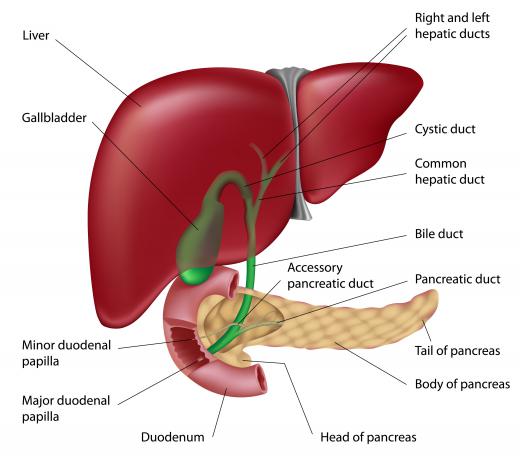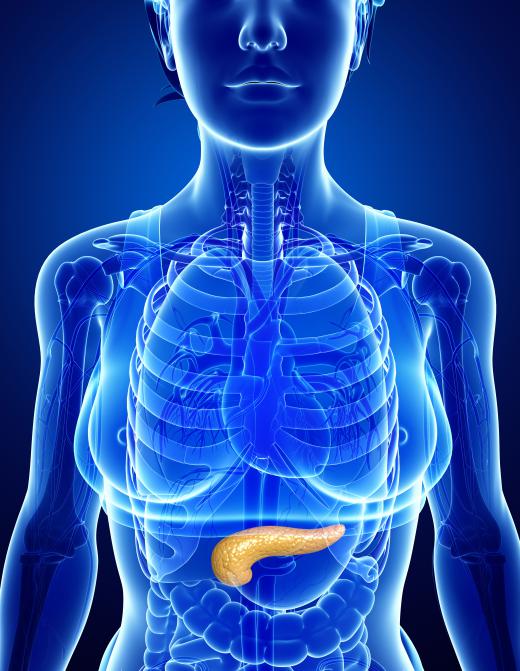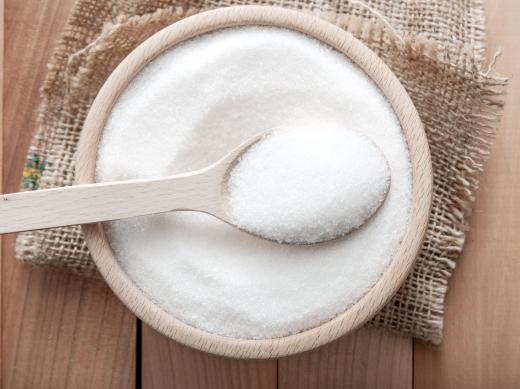What is an Insulin Receptor?
In cell biology, a receptor is a region on the cell membrane that binds to a substance. Usually, receptors are proteins found on or within the membrane. Many different types of molecules can bind to receptors on the cell surface, including hormones. An insulin receptor is an example of a receptor that binds to a hormones, specifically insulin.
Insulin is a very important hormone as it regulates the level of glucose, a sugar, in the blood. This protein is formed in specialized cells of the pancreas called beta islet cells. In response to levels of glucose in the blood, these cells become activated to produce insulin. In other words, if the glucose level is high, the islet cells produce and secrete insulin. When the glucose levels are low, they stop the production of the hormone.

Insulin is secreted into the blood stream so that it can be carried throughout the body. On reaching the liver, insulin interacts with the insulin receptors found on the cell membranes of the liver cells. Insulin does not enter the cell after it has attached to a receptor. Instead, the receptor is activated and causes another substance to be generated or activated within the cell.

When insulin binds with an insulin receptor, a number of different chemical reactions are affected within the liver cell. First, it causes the liver cell to increase the breakdown of glucose. Insulin activation also facilitates the conversion of glucose to glycogen and fat. Glycogen is a polysaccharide that is made up of many glucose molecules and is the principal storage form of carbohydrates in animals.

Lastly, the reaction that breaks down glycogen into glucose molecules is inhibited when an insulin receptor is activated. In this way, insulin inhibits the production of glucose by the liver cells. By affecting these three processes within the liver cells, insulin effectively lowers the level of glucose found in the body.
As the levels of glucose in the blood stream decrease, the pancreas produces less insulin and eventually stops. With the absence of insulin in the blood, the insulin receptors will not be activated by having insulin bind to them. This has the opposite effect on the liver cells. The breakdown of glucose becomes inhibited and additional glucose is formed from storage compounds, leading to an increase in the glucose levels in the blood.

Insulin receptors are an example of protein kinases. A kinase is an enzyme that catalyzes phosphorylation reactions, or reactions that add a phosphate group to a substance by ATP. ATP, or adenosine triphosphate, is an organic compound that has three phosphate groups and acts as an energy store for most organisms. In the case of insulin receptors, an amino acid called tyrosine that is found on other proteins is phosphorylated, making them tyrosine kinases.

When insulin binds to the receptor on the cell surface, the receptor changes shape so that the kinase regions inside the cell become activated. The activated insulin receptor then activates a number of different targets within the cell. The targets are often enzymes, leading to the increase or decrease in the different chemical reactions involving glucose, as described earlier. The effect of insulin on liver cells is called a tyrosine kinase second messenger system.
AS FEATURED ON:
AS FEATURED ON:
















Discussion Comments
@feruze-- That's a good question and I should probably know this since I have type two diabetes.
All I know is that the diabetes medication I'm taking increases the number of insulin receptors to improve insulin sensitivity in my body.
So I guess type two diabetes is when there are not enough insulin receptors which causes glucose levels in the blood to go up really high. But I could be wrong.
@anon149799-- Glucagon does the opposite of insulin, together they work together to keep glucose levels in the bloodstream stable.
Insulin picks up glucose/sugar molecules from the bloodstream while glucagon releases glucose into the bloodstream. One of these is activated depending on the amount of glucose in the blood.
So if there is a lot of glucose in the blood, insulin will be activated which will pick up the glucose from the blood and store them elsewhere. If glucose in the blood is low, glucagon will be activated which will break down glucose molecules and release them into the bloodstream.
This way, they make sure that there is a stable supply of energy for the body.
What is the role of insulin receptors in type 2 diabetes?
I need to learn about this for my assignment.
It's glycogen.
What about glucagon?
Post your comments